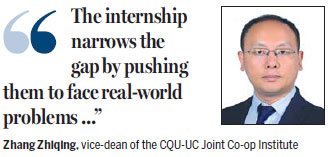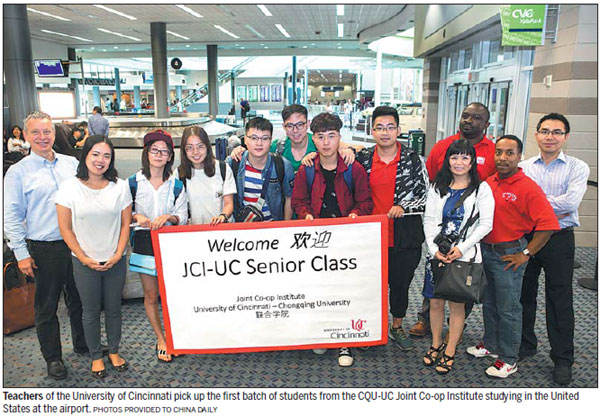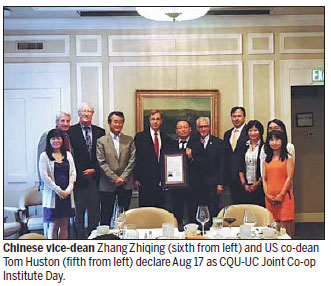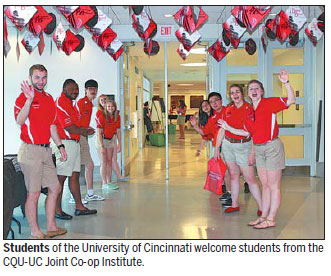Bringing together classroom learning, real-world applications
Innovative model uses internships to apply knowledge in the workplace
For higher education experts, teaching students how to apply classroom knowledge in the real world has been an ongoing challenge. The four-year exploration of a new cooperative education model at Chongqing University could produce an answer, according to Zhang Zhiqing, vice-dean of the Chongqing University-University of Cincinnati Joint Co-op Institute.
The cooperative education model merges internships with academic study, to help students to transite their knowledge of theory to practice and solve workplace problems. The University of Cincinnati pioneered cooperative education in 1906. Former UC dean Teik Lim was the founder of the CQU-UC Joint Co-op Institute.

The model was introduced to CQU in 2013, and it is one of the top educational institutions in China. Princeton Review, college admission services company, ranked the joint program with UC in the top 5 percent of the 2,500 public research-oriented universities in the world.
Zhang said students of the institute that major in either electrical engineering and automation, or machine design manufacturing and automation - two key majors at the university - will have a five-year learning period in undergraduate study.
From the second to fourth years of study, students will alternate between staying at school for four months and working in companies for four months.
The institute signed an agreement with more than 40 enterprises, including nine Fortune Global 500 companies, for students to have paid internships. Taking part in the internship is a requirement for graduation.
"There is a gap between college education and the skill sets needed by the market," Zhang said. "Students tend to listen to what the teachers say in class, take some notes and stay up for a few nights before the test, and eventually forget everything they have learnt."
"The internship narrows the gap by pushing them to face real-world problems and even have a chance to experience the cutting-edge trends of the industry," he said.
They will also have a better understanding of their major and what knowledge they need most, he added. Students also learn more about society, how to communicate with people and how to shoulder social responsibility.
Zhang explained that when students doing job hunting, they may have a superficial understanding of the company they will work for. Some will choose to leave when they find out the job is not what they imagined, wasting both the time and energy of the individuals and the companies.
However, after 20 months of working in the industry, the employees and employers will both know each other well.
"I have heard a female student already received a verbal offer from GE," he said.
"The first batch of students is currently studying in the United States for their last year of study. It won't take long to see the impact of the cooperative education program."
Companies have shown their appreciation of the cooperative education program, including Siemens China, ABB, GE and Changan Ford Automobile.
Prasanna Malaviya, senior director of research and development at One Ethicon & DePuy Synthes China, a subsidiary of Johnson & Johnson Medical (China) Ltd, said it's the best way for engineering students to catch up with the working world quickly after graduation.
"Some Chinese students suffer the first few months working at multinational companies because they don't know how to make full use of their talent."
When exposed to real-world problems, students are very quick to learn to solve issues outside the classroom, he added.
Another highlight of the program is the all-English teaching and application of Western educational philosophy.
About half of the specialized courses were taught by professors from UC, including some former engineers and managers of world-famous companies, such as GE, Zhang said.
The courses are organized in the form of small-sized classes, panel discussions and procedural learning, to encourage students to verbalize their ideas and participate more proactively in academic activities, said Zhang.
Students in other schools of Chongqing University can apply to attend the cooperative education program and enroll if they pass the language tests. The fee is $60,000 per degree.




(China Daily 11/09/2017 page12)














